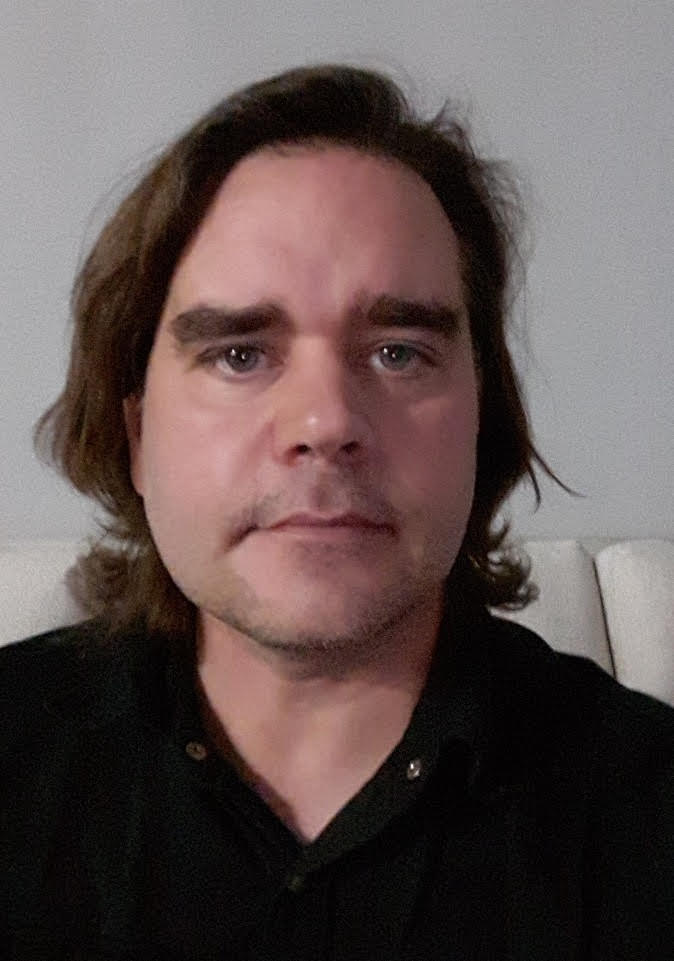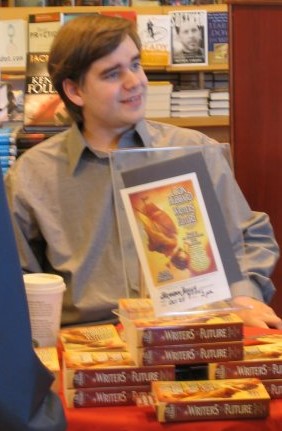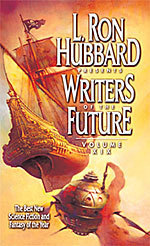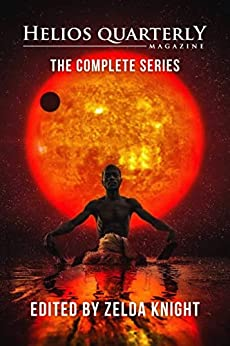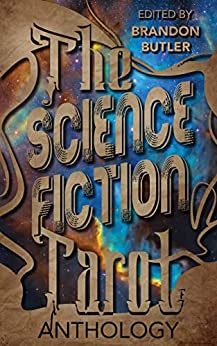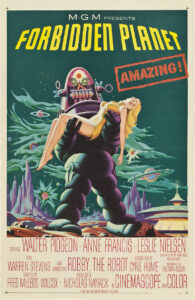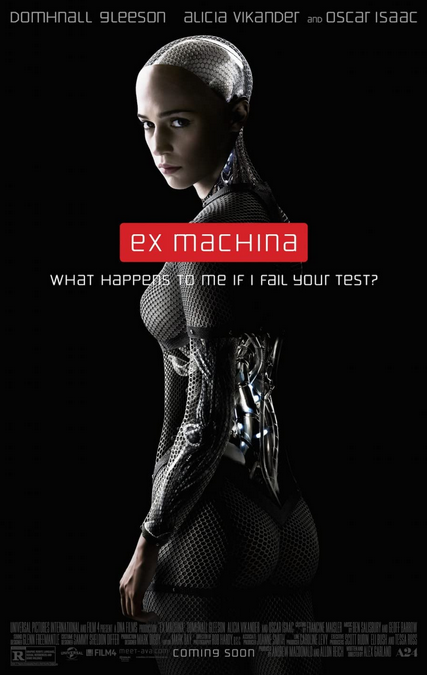After interviewing several authors whose stories appear in The Science Fiction Tarot, it’s time I interviewed the anthology’s editor. As is the case with many editors, Brandon Butler is also an author.
Brandon Butler is a Canadian and a Maritimer, not always in that order, born and raised in Halifax Nova Scotia. He studied English and Computer Science at Dalhousie University before becoming a winner of the Writers of the Future Contest made profound effects on his early writing. Relocating to Toronto in 2008, he now works in the tech industry while writing and publishing short stories, novels, anthologies and film scripts.
Next, the interview:
Poseidon’s Scribe: How and when did you get started writing fiction?
Brandon Butler: I really think it began by reading ‘clicking’ for me at a young age and going from there. I wanted to be a writer for a long time before discovering how hard it really was! A big step along the way was fanfiction. I wrote a good amount of Star Wars and Star Trek stuff in the early days of the internet to entertain myself and people I met online until one day I thought ‘why not just create my own stuff?’. For me, in a way, it was my first moment of ‘going pro’. And so, it all began.
P.S.: You’ve cited Harlan Ellison and Roger Zelazny as inspirations for your writing. What about those two authors, in particular, do you find compelling?
B.B.: I continue to be in awe in how Roger Zelazny was able to create such unique, epic tales such as the Amber series in so few words. There are other writing styles, but I think it speaks to the power of brevity and how the most important thing is to convey ideas and concepts that will engage the reader.
Although Harlan Ellison was also known for shorter works and even shorter temper, what I find compelling is his sheer power of emotion, and the willingness to pull from the negative side of the spectrum. I sometimes wonder if writers might be a little less willing to engage with anger and hatred than he was. If so, maybe we ought to think about that because as human beings there’s a time for rage just as there’s a time for joy and affection. It must be managed, but it’s all a part of who we are. And the more often you explore an emotion, the better you’ll understand it – or at least that’s what I believe.
P.S.: Do any facets of your ‘day job’ as a computer programmer find their way into your stories?
B.B.: When writing science fiction, it certainly helps! Knowing a little about how computers work and think can be useful when machines become characters in your stories. Once in a while you might run across a new idea to explore in fiction, but I also find it helps a lot in making your technology sound authentic. There’s nothing a little memory deallocation can’t hurt.
P.S.: Congratulations on winning the Writers of the Future contest. What was that experience like?
B.B.: Unreal. I received word a little over a year before and went to the event in Los Angeles only a couple months after I graduated from Computer Science. It was my first time leaving the Maritimes since I was very small. Getting to meet and learn from authors who I had read, spend time on the other side of the continent from where I’d grown up, and meet so many other writers beginning their careers was a formative experience to say the least. It was like the world I inhabited grew tenfold in a few short weeks.
P.S.: Is there a common attribute that ties your fiction together (genre, character types, settings, themes) or are you a more eclectic author?
B.B.: The latter, really. I try to be as eclectic as possible. Writing chiefly short stories means that you can get more separate stories done in a shorter time, and once I’m done one piece, I usually want to go in an entirely different direction for the next one. That said, I do notice certain themes cropping up in my work more than others. Relations between men and women is a large one (platonic, romantic, antagonistic, and all types in between). Another one is the broader reasons as to why we find ourselves in conflict with one another, and to what degree humans, as a species, may seek instability when things seem peaceful. Religion and the power of mythology also seems to pop up from time to time, although as a second-generation atheist, I’m not a religious person.
P.S.: Tell us about “The Fire, as it Eats Itself,” published in Helios Quarterly Magazine.
B.B.: It’s a story about a Fireman and captive Demon set in a world that’s post-rapture, where hellfire slowly consumes the planet over an extended period of time. Imps, Demons and Wraiths often enter the real world, and gunfire only stings them while water is deadly. That fact raises the importance of the Fire Department in the society that’s been left behind. The pair then work both with and against each other as they try to find the cause of a recent flare of fires that have broken out in the surrounding city.
It’s a story I wrote over fifteen years ago, and for a long time was probably the strongest story I’d written. It’s still one of my absolute best and I was overjoyed to finally sell it.
P.S.: What is your current work in progress? Would you mind telling us a little about it?
B.B.: Work on the anthology caused me to redirect some of my focus, but in about another month I’ll be going back to handful of short stories and a couple screenplays. Two short stories I’m working on right now involve a protagonist unable to leave a semi-sentient tower that no longer wants him, and look at a world after a synthetic takeover where the machines have turned out to be rather less than infallible. And my screenplay is a non-speculative historical biopic set in the French Revolution.
There’s also a novel series about a pair of immortals I need to get back to – I completed the first one after the pandemic but there’s a significant amount of work that needs to be done from the midpoint onwards, as well as starting up the second book once the first is finished to a level at which I’m satisfied.
P.S.: How did you first get involved in editing fiction?
B.B.: The first editing work I did was back in High School for a non-speculative anthology concentrating on the pressures and ramification of war. I and a few other students had an opportunity to work on a ‘real-world’ project, so I’d say that counts as my first experience as an editor. I also worked here and there as both a contributor and editor to my High School and University newspapers, and I served as one of the staff for T.Spec’s Imps and Minions anthology a few years back, helping to select and offer feedback on submissions.
Mainly though, my editorial experience comes from reading my own work, and viewing it with a critical eye that’s as fair as possible. Seeing and correcting issues with what I’ve written has become an experience that’s both time consuming and enjoyable, to the point that it’s one of my favorite things to do. And after I’ve been away from writing for a while, I’ll usually start by editing one of my existing stories to get me back in the authorial headspace.
P.S.: How did the idea of The Science Fiction Tarot come about?
B.B.: On a Zoom call during the pandemic. It began with a conversation where someone mentioned she had learned how to read tarot, or wanted to. I believe either she or many others in the group tended to be into YA, Harry Potter and that sort of material (I personally tend towards what I personally term as the previous hot trend of late 70s-early 90s horror and dark SF: Stephen King/Dean Koontz or, more lately, Black Mirror), and I jotted down the idea of a tarot card deck for a new generation. As in, one with different cards. Zelazny’s Amber series was probably showing its influence again there with its use of trumps.
Originally it was a story idea and I spent a few months trying to get it to work, but it wasn’t coming together. Finally, I began to conceive of it as an anthology, since it seemed to me the card concept could function exceptionally as a list of contrasting topics – not unlike how the album Dark Side of the Moon tackles its concept of the pressures of modern life.
The last wrinkle was the involvement of Managing Editor Andy Dibble, who was a big part of the early work on the book. We had a conversation while I was still putting the idea together, and he suggested a focus on Science Fiction. Until then I’d been thinking of a speculative anthology with contemporary card themes. His suggestion seemed simpler and straightforward, so naturally I jumped on it. And so, The Science Fiction Tarot was born!
P.S.: People use conventional tarot cards for prediction, self-exploration, or care therapy. Will readers of this anthology know the future, know themselves, feel better, or enjoy some other benefit?
B.B.: Perhaps all four! In knowing yourself you probably know at least some of your future, so doesn’t that make you feel better? And it certainly comes with other benefits! Kidding aside though, I think it’s great that tarot is used in so many multifaceted ways. We created actual decks for our kickstarter backers of just our major arcana and a handful of other cards. Anyone who would want to use our cards to help in anything they do would be fantastic. And some of our cards take direct inspiration from the original tarot, so I can imagine there’s plenty of room to explore tons of possibilities.
P.S.: What plans do you have, if any, to edit future anthologies?
B.B.: Like with my short stories, I tend to want to do something else after finishing a large project. So, no particular plans for more editing in my near future, although I rule nothing out. If something comes along that I want to do, then something comes along. There’s been talk about us doing another project, but it’s just conversation so far.
Ultimately though, I didn’t commit to this project because I wanted to do an anthology – I had an idea that I wanted to do that became The Science Fiction Tarot, which happened to be an anthology. If that distinction makes sense.
P.S.: What advice can you offer aspiring writers or editors?
B.B.: Let your ideas own themselves. Although I find it’s essential to form pictures in your head of what happens in your story or what form your editing project will take, try to sense the natural boundaries of what you have. Instinct and experience help with that, although they take time to develop.
It’s maybe a commentary on that old Andy Warhol quote of getting your 15 minutes of fame: I prefer to think of it as waiting until you have something to say, then saying it and taking as long as you need until you’re done. And then leaving the stage for the next person and giving yourself a break until there’s something else to say. Which there often is. There’s time enough for everything in life, and a big help in working on any project is knowing where you are during its beginning, middle and end.
Thank you, Brandon.
Readers can learn more about Brandon Butler at his website, on Twitter, on Goodreads, and on Amazon. Also check out a previous interview of Brandon by Angelique Fawns of Horror Tree here.

